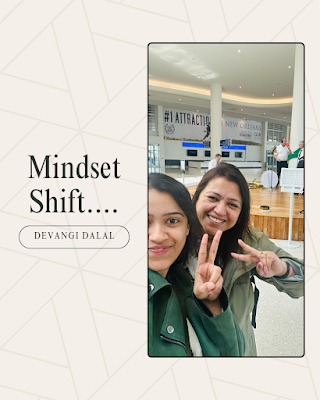Mindset Shift....
Mindset Shift....
Mindset shift… We humans have a unique feature that sets us apart from other creatures in the universe—the ability to think, thanks to our brain. The human brain is a highly complex organ that processes information through billions of interconnected nerve cells, communicating via chemical and electrical signals. This enables us to perform everything from basic life functions to complex thoughts and actions that we learn over time. We are witnessing a massive scientific revolution in every aspect of life, as humans now have greater exposure to technology. The result of this evolution in complex thought and action has led to a major shift—Artificial Intelligence (AI). AI is an advanced subset of machine learning that utilizes intricate algorithms, also known as deep neural networks, which closely emulate human thought and actions. This allows systems to process information with remarkable precision. What a shift—from the human brain to a system that processes the human brain!
I am here in the USA attending a conference that discusses the remarkable revolution in hearing health brought about by artificial intelligence. In the past, we relied on simple amplifiers to hear, but now, hearing aids are equipped with AI algorithms. These devices can be precisely tailored to an individual’s brain and incorporate deep learning to understand what the human brain truly needs. Previously, we measured time by observing the position of the sun’s rays and calculating their shifts. Today, machine learning not only tells us the time but also predicts the weather, controls air conditioning, and enhances smartphones and other devices by collecting data from both the environment and human interactions. As people of the 21st century, we are experiencing an era of technological transformation—but how much has our own mindset truly shifted?
In some parts of the world, people are still unaware that something can be done for individuals who are labeled as deaf or have hearing disabilities. There are many myths and misconceptions, such as questioning why advanced technology is needed to help the hearing-impaired, why money should be spent on such technology, and why they should be included in society. Many fail to realize that they are not a liability but an asset to society. On the other hand, there has been a significant technological shift, enabling individuals with hearing disabilities to excel—sometimes even beyond those with normal hearing—if the right mindset and direction are in place.
We now have ChatGPT, Google Gemini, and many other AI-driven tools where people only need to think about what they want, and AI will execute the actions. A time may come when human thinking itself is no longer required—machines will simply implement whatever humans need to do.The issue I see here is that while scientists and researchers have made tremendous advancements in technology through their complex thoughts and actions, we humans have yet to undergo a mindset shift. We must recognize that this technology is created by us, and it should be implemented thoughtfully—used when necessary, rather than making ourselves entirely dependent on it.
One of the presenters made a powerful statement: “If Alexa can understand my speech, then why can’t my hearing aids?” This highlights the revolutionary advancements being made to assist people with hearing difficulties. However, the real question is—are people truly ready to embrace this technological shift with a corresponding shift in mindset? There is also a deeper, philosophical perspective to consider: “If Alexa is listening to your speech, is your mind ready to shift its thought process?” Over the years, change has been constant—whether in the rituals we follow, our religious beliefs, our way of living, or even the way we connect with our loved ones. Are we fostering healthy connections with our children, with those in need, and with the world around us?
At this conference, I also learned about emotional intelligence. It is often misunderstood as the opposite of intelligence, but in reality, it is not the triumph of heart over head—it is the unique communication between both. While we are learning about technology with our minds, we also need to think with our hearts—whether it is about self-management, self-regulation, self-awareness, or self-motivation. If we want AI to work for us, we must first work on ourselves. Only then will AI truly benefit us. We need to shift our mindset with a higher emotional intelligence (EQ), making better decisions that serve both ourselves and others. We must remain calm, resolve conflicts effectively, think positively, actively listen, and respond thoughtfully to constructive criticism.
I also learned about meditation. We are in an era of artificial intelligence, yet at the same time, natural calamities are on the rise due to our neglect of nature. Mental health issues and negativity are increasing, and even though we try meditation, many of us still struggle to concentrate. This calls for a mindset shift—one that embraces calmness, compassion for our actions, and a deeper connection with ourselves, our loved ones, and those around us in need. Such a change is only possible when we adopt positivity in our lives. I have started doing this—what about you?










भारतीय नववर्ष चैत्र शुक्ल प्रतिपदा विक्रम सम्वत 2082 व
ReplyDeleteचैत्र नवरात्रि की आपको सपरिवार हार्दिक बधाई एवं शुभकामनाएँ...
यह नववर्ष हम सभी के जीवन में सुख, समृद्धि और वैभव लेकर आये, ऐसी कामना है।🚩
जय माता दी जय श्री राधे कृष्ण 🙏